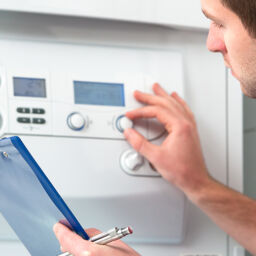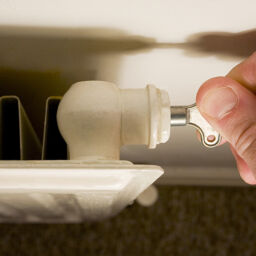A boiler is generally the most-used household appliance, but if you take good care of it by getting an annual service and keeping on top of maintenance, your boiler can live a long life. Unless your heating goes off or you lose your hot water, boiler faults are not always obvious. Unexpected issues may arise which, if left unnoticed, can be a danger to those in your household and lead to long-term issues.
This article will provide you with key things to look out for when assessing whether you should replace your boiler or whether it simply needs a service or minor repair.
1. You’re experiencing frequent breakdowns
If you are ringing round in search of a gas engineer more than once a year, then it may be better to replace your boiler rather than forking out the costs of expensive repairs. Your annual service should be sufficient to keep your boiler in good shape. If you’re still having problems after your service, it may be a sign that you need a new boiler.
2. You’ve noticed your energy bills increasing
High energy bills are usually a reflection of an older and more inefficient boiler. To find out how efficient a boiler is, you can see the ErP energy label. These labels use a colour scale ranging from dark green (A-rated) to red (G-rated). A-rated boilers have a 90% (and above) efficiency rating, while G-rated boilers are generally less than 70% efficient. Not only does a more efficient boiler cut the costs of your energy bills, but it also helps the environment. The Energy Saving Trust estimated that replacing a G-rated boiler with an A-rated system will save you an estimated £320 per annum on your gas bill.
When deciding whether to replace your current boiler or not, you should weigh up the costs of bills and see if it is worthwhile. If you have decided to get a boiler replacement, you should opt for a modern condensing system. If your boiler is relatively efficient but your energy bills are still high, you may want to consider switching to another energy provider.
3. Your boiler or radiators are noisy
It is normal and harmless for a boiler to make some noise, but this should be no more than a low and constant hum, which most people would not notice. However, if there is a sudden change in the sound and volume of noise made by your boiler, you ought to check it out.
Tapping sounds on pipes and/or radiators may indicate built up sludge in your central heating system. This is easily fixed with a powerflush. Loud humming, vibrating, or banging noises indicate a more serious problem, such as a broken valve, heat pump problems or general wear and tear. If your boiler is being noisy, you should switch it off to prevent further damage from occurring and call a Gas Safe registered engineer to ensure it is safe for use.
4. Your boiler smells funny
Should you notice a sulphurous, eggy smell coming from your boiler, turn it off immediately and call the emergency gas line on 0800 111 999 as you may be experiencing a gas leak. A healthy boiler should not produce an odour.
A Carbon Monoxide (CO) leak is dangerous and potentially fatal. An odour may result from a CO leak as it causes the boiler to not burn properly. However, Carbon Monoxide (CO) itself is odourless, meaning you should look for other signs, such as:
- Blue flame has turned yellow
- Dark soot stains on and around the boiler
- Pilot light that frequently blows out
- Increased condensation inside windows
Symptoms of CO poisoning include headaches, shortness of breath, nausea and unconsciousness. Should you notice any signs and/or symptoms of a CO leak, evacuate immediately and call the emergency gas line on 0800 111 999 for a gas engineer to safely inspect the boiler. You should see a doctor and, if you have a pet, take them to the vet. To protect yourself and those in your home, it is advisable for you to install a CO alarm.
5. Your boiler is leaking
Your boiler should never leak water. Doing so could mean the internal parts may be faulty or have started to disintegrate. A leaking boiler wastes water and indicates inefficiency. Left unfixed, a leaking boiler could lead to rust, corrosion, and even structural damage to your property. If your boiler is leaking, switch it off and book an appointment with a Gas Safe engineer.
6. Replacement parts are hard to find
When looking for replacement parts for your boiler, it’s important to research cost and availability. If you’re struggling to find replacement parts for your boiler, you should weigh up whether it is more practical and economical to get a boiler replacement. This may not be necessary if your boiler rarely has any issues. On the other hand, if you’re frequently scouring the internet for new parts, it may be worth getting a boiler replacement.
7. Your boiler isn’t working like it used to
If your boiler isn’t working like it used to, the following issues may be tell-tale signs that you’re in need of a boiler replacement:
- Radiators are staying tepid or taking longer to heat up
- You constantly have to adjust your boiler pressure
- Your home is only lukewarm even though your heating is on full
- Water takes ages to heat up or is not as hot as it used to be
These are all signs that you either need a service or your boiler is on its way out. You should first check for build-up/blockage in your central heating system as dirty water in your system can cause long-term problems if left unfixed for a long time.

It is always best to contact an engineer listed on the Gas Safe Register to check whether there is a minor problem that can be easily fixed, or if there are more serious underlying issues that necessitate a replacement boiler.
Call our customer service team on 0800 014 7199 for further advice on whether you need a boiler replacement.



